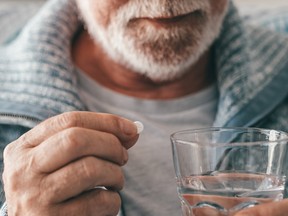Discovered by Canadian scientists decades ago, rapamycin has been called the most promising anti-aging drug to date

A drug isolated from the soils of Easter Island by Canadian scientists decades ago is being touted by tech moguls and longevity fanatics as one of the best shots at slowing human aging.
Most of the studies that met the researchers’ criteria were small and short-lived. Some involved a mere single dose of rapamycin or its derivatives. However, scientists are now testing whether rapamycin can reduce brain changes in older adults with early-stage Alzheimer’s, among the most dreaded diseases of the old.
A pivotal study published in the journal Nature in 2009 found that, when fed late in life, rapamycin increased survival in both male (by nine per cent) and female (14 per cent) mice, the first time a pharmacological agent was shown to extend lifespan in both genders.
The demonstrated effects in mice, however, have been small. “And mice are very different beasts from people, in terms of metabolism, in terms of everything,” said McGill University experimental biologist Siegfried Hekimi. Mice live in lab cages. They aren’t exposed to the same environments as humans.
“I think it’s crazy to take a drug which will have an effect on you, but you can’t know that it’s going to be a good one,” he said.
Rapamycin is the fruit of a Canadian-led medical expedition to Easter Island in the South Pacific in 1964. The Canadians were curious: Why did the island’s natives have a low incidence of tetanus despite walking around barefoot? Suspecting the soil had antibacterial compounds, samples were collected, shipped back to Canada and handed over to Surendra (Suren) Sehgal, a microbiologist working at Ayerst labs in Montreal who discovered the dirt contained a bacterium that produced a potent anti-fungal compound.
Rapamycin acts on a highly complex pathway called mTor (“mechanistic target of rapamycin”) that senses nutrients in cells, telling the cells what to do next, including whether or not to grow. The pathway has been linked to multiple disease processes, the Lancet review authors wrote: waning immune and lung function, bone loss (leading to osteoporosis), cancer, hardening of the arteries from plaque buildup, and neurodegeneration (dying brain cells).
In addition to mice, rapamycin has extended the lifespan of yeast, flies and worms.
“But that is so far removed from you taking a bioactive drug, which is, among many other things, an immunosuppressant,” Hekimi said.
When given in prescribed daily doses to cancer or organ transplant patients, rapamycin can cause mouth ulcers, generalized pain, fever, nausea, abdominal pain, constipation, diarrhea, low blood platelet counts, elevated cholesterol and numerous other adverse events. For those reasons, it’s no longer used or prescribed often, Discover Magazine reported.
One of the challenges of repurposing rapamycin as an anti-aging compound is to avoid those side effects by giving it in smaller, intermittent doses.
“Of course (proponents) will tell you it’s not the same dosage, etc., etc., etc.,” Hekimi said. “All that’s good and true. It doesn’t mean that the dosage you’re giving or taking doesn’t have effects that you don’t want, in the absence of having shown that it has the effects that you do want.”
Any clinical trial testing a drug for lifespan would have to follow people for decades.
“I’m not saying that it’s not conceivable” that some drug could measurably increase survival, Hekimi said. Some drugs, like blood pressure lowering drugs, already do that. High blood pressure is bad for the brain, bad for the heart and bad for kidneys. “So, it has a multi-organ effect,” Hekimi said. Anti-diabetic drugs also increase survival. So do non-pharmaceutical interventions like exercising, “eating your veggies, losing a bit of weight.”
“But people hang onto this notion, ‘Maybe I can live longer, healthy, with just one miracle drug,’” he said.
Some scientists have begun testing it in older adults with gum disease (it’s been found to “rejuvenate” oral health in aging mice).
But the Lancet review, overall, found no evidence in the studies assessed that rapamycin can enhance learning and memory. And while the authors of a small pilot study in 50 women reported a weekly dose of rapamycin delayed ovarian aging by 20 per cent, postponing menopause increases exposure to estrogen, raising the risk of breast and ovarian cancer.
National Post
Our website is the place for the latest breaking news, exclusive scoops, longreads and provocative commentary. Please bookmark nationalpost.com and sign up for our daily newsletter, Posted, here.